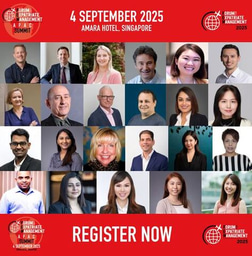Gender and Global Mobility: Why should we be talking about it?
_large.jpg)
Gender equality, diversity, inclusion, these are words and phrases that organisations love to pride themselves about - especially in the 21st century. But are these just the latest buzzwords used loosely to portray a forward thinking and progressive organisation? Does this ‘gender equality’ extend toward all areas of the company? Or is there an unconscious bias, in certain sectors, so ingrained that we fail to recognise that it exists?
With organisations going global, more companies are increasingly keen on establishing overseas hubs. On the surface the global mobility sector is awash with female mobility managers at various levels of seniority. Human resource departments are similarly gender diverse as well. So it is undeniable, that there is some truth to the gender equality claims by organisations.
Statistics on Female Expatriates
A closer look at the international assignees global mobility managers are managing, however, has something quite surprising to reveal. Although women are increasingly provided the opportunity to undertake leadership roles in companies, there is a huge disparity in the number of female employees assigned overseas compared to their male counterparts.
Therefore, the questions we should be asking are how many female assignees are organisations able to send off on foreign assignments and why are there so few of them?
Despite the increasing number of highly skilled women and improved focus on gender equality in the workplace over the last 10 years, growth in female participation in offshore work assignments has been slow. Data from international consulting firm PricewaterhouseCoopers, shows no discernible upward trend in the percentage of female expatriates for more than 10,000 workers assigned overseas from 2005. There is a distinct disconnectedness between the increasing demand for global mobility and the number of women who actually work abroad.
As a global employment organisation, this gender disparity in overseas assignments is not news to us. Based on our own figures, women make up only 16.7% of the employees we currently have employed globally for companies across the world. This number is undoubtedly disconcerting. A further analysis of statistics gathered by industry leaders reaffirm and correlate with our own findings.
According to a study by PWC and Melbourne University’s Centre for Ethical Leadership (CEL) just one in four outbound expatriates from Australia are female. The statistics and survey figures from across the world point to the fact that there is a proportionally lower representation of female expatriates, but moderately higher numbers of women in administrative and human resource roles. The 'Addressing gender bias in global mobility: developing female leaders,' report explained that 70 per cent of female employees want to work outside Australia at some point, but are hampered by a combination of factors. Some of the reasons include concerns over repatriation and the lack of role models.
A similar recent report of approximately 4,000 professionals from 40 countries, revealed some alarming numbers; 71% of female millennials want to work outside their home country during their career, but only 20% of the current internationally mobile population are women and only 22% of global mobility executives are actively trying to increase the numbers of female expatriates. These statistics reveal a significant discrepancy between women who express a desire to work overseas and the number of women who actually do. There are a multitude of factors influencing the issue which makes it a challenge to identify exactly what causes this discrepancy.
Are women shying away from these opportunities when they are presented with them? Or are organisations innately turning to their male workers to send them on overseas assignments? Perhaps, there really is an inherent bias in workplace settings where men are automatically selected for international assignments.
There needs to be more research and data about gender and global mobility and for now we can only speculate the reasons. The existing statistics raises important questions about the sector’s understanding and lack of knowledge on the issue. However, it provides an opportunity to build awareness and understanding in the industry to promote informed debate about which strategies will be most beneficial to move the dial on women’s representation in international assignments.
Conclusion
In order to achieve some semblance of gender equality at the work place, organisations should not merely be content with a 50-50 quota of employees. As discussed, there are areas remaining where deep-seated gender disparities exist and men are dominating over their equally capable female counterparts in overseas work engagements. Gender equality should extend towards sectors such as global mobility. Women should not only be presented with equal opportunities to take up offshore work but they should also be encouraged to do so. The current statistics clearly highlight the inequality between genders in global mobility.
What companies also need to realise is that gender and global mobility is beyond just a social issue — it is highly problematic with financial, legislative, risk management, and talent retention implications. Understanding the full extent of lack of diversity, the implications it has and genuinely recognising the need for diversity will lead to thinking that is required to redress the balance.
To understand the full impact of the lack of diversity it is essential to look into the key sources of bias, assumptions made about candidates based on their gender and discuss strategies to counter existing assumptions and prejudice.
About Shield GEO
Shield GEO provides Employer of Record solutions in more than 90 countries around the world, ensuring legal compliance and rapid deployment of staff into any market for our corporate clients. We make international employment simple. To find out more about us, please get in touch.





Please sign in or register for FREE
Sign in OR sign up to become a registered The Forum for Expatriate Management website user
Subscribe here